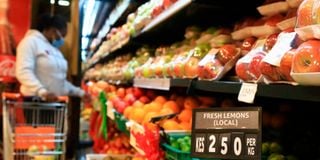Premium
Kenya's inflation hits record-high of 8.3 percent

A customer picks fruits at a Naivas supermarket in Nyeri. Data released by the Kenya National Bureau of Statistics (KNBS) shows inflation hit a 61-month high despite state subsidies on key commodities and tax cuts that were applied during the month.
What you need to know:
- Inflation hit a 61-month high despite state subsidies on key commodities and tax cuts that were applied during the month.
- The inflation was mainly driven by the increase in prices of food and non-alcoholic beverages which rose 15.3 percent from July last year.
Inflation rose for the fourth month in a row to hit 8.3 percent this month driven by rising food and fuel prices that have pushed the cost of living to the roof affecting millions of Kenyans.
Data released by the Kenya National Bureau of Statistics (KNBS) shows inflation hit a 61-month high despite state subsidies on key commodities and tax cuts that were applied during the month.
The inflation was mainly driven by the increase in prices of food and non-alcoholic beverages which rose 15.3 percent from July last year, transport grew 7 percent, and housing, water, electricity, gas and other fuels by 5.6 percent.
“The overall year-on-year inflation rate as measured by the Consumer Price Index (CPI) was 8.3 percent, in July 2022. The month-to-month Food and Non-Alcoholic Beverages Index increased by 1.1 percent between June 2022 and July 2022,” said KNBS Director-General MacDonald Obudho.
The cost of a kilogram of loose maize grain has shot up 31.5 percent year-on-year due to maize shortage which has led to high maize flour prices, that of white rice has risen 13.4 percent while the price of Irish potatoes has shot up 15.4 percent during the same period.
“Alcoholic Beverages, Tobacco and Narcotics Index increased by 1.3 percent between June 2022 and July 2022. This was due to an increase in prices of beer (lagers and stouts), among other items,” said Mr Obudho.
LPG prices drop
Meanwhile, cooking gas prices fell by 3.7 percent in July from June after a reduction in the Value Added Tax (VAT) charged on the product, helping ease the pressure of high energy costs on households.
The price cuts follow the enactment of the Finance Act 2022 which lowered the VAT charged on liquefied petroleum gas (LPG) supplies from 16 percent to eight per cent.
This also comes just a week after the government sealed a subsidy deal with maize millers to lower the cost of maize flour to Sh100 per 2-kilogram packet down from Sh205.
President Uhuru Kenyatta said maize flour had gone out of reach for many Kenyans due to the high prices and suspended levies charged on imported maize including the Railway Development Levy (RDL) and Import Declaration Fee (IDF).
“I note with regret that the cost of a 2 kg pack of maize-meal remains out of reach for many, as it is currently retailing at an average of Sh205,” said President Kenyatta.
The Head of State also this month intervened and set aside Sh16.7 billion for the fuel subsidy which kept prices unchanged during the mid-July review.
The subsidy relieved consumers from high fuel prices which would have led to a subsequent increase in transport costs.
The Central Bank of Kenya on Wednesday during its Monetary Policy Committee (MPC) meeting left its benchmark lending rate at 7.5 percent unchanged which is set to steady the cost of loans from lenders.
The CBK adjusted the rate in the previous review which saw the cost of lending go up as the government sought to keep the soaring inflation in check.





